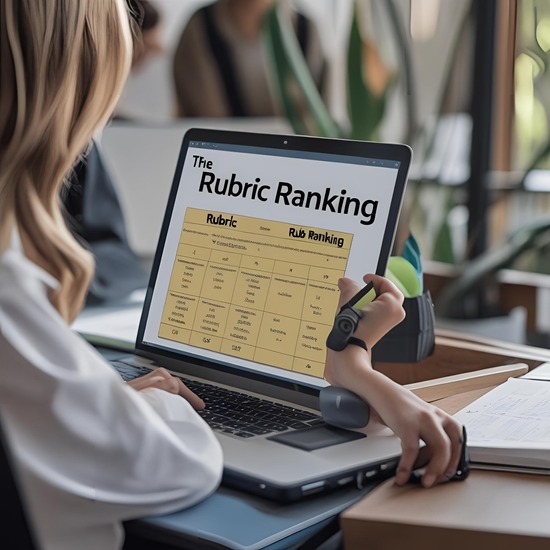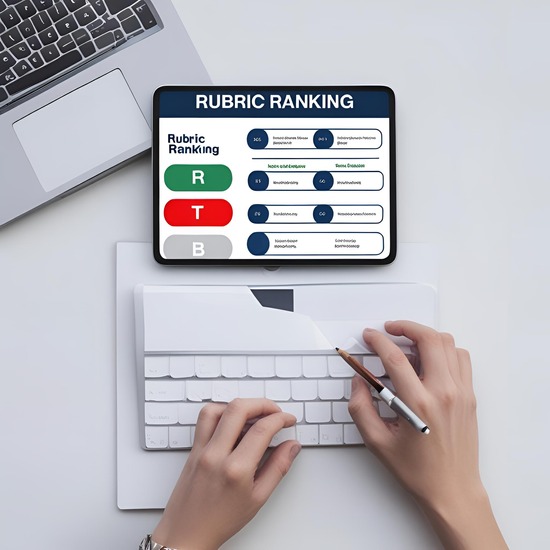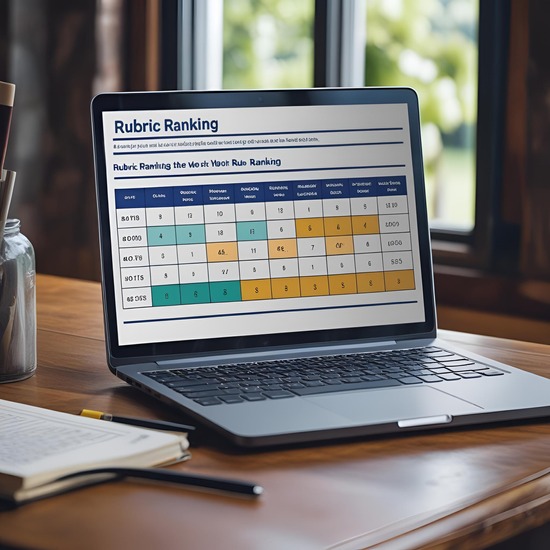Ever seen a chart that breaks down how your school project or work performance is being judged? That’s a Rub Ranking in action. It’s a system that uses easy-to-follow procedures to rate or assess performance. It’s utilized in more locations than you might think, including offices and classrooms. Let’s examine Rub Ranking’s definition, operation, and benefits in the modern world.

The Basics of Rub Ranking
Simple Definition
The abbreviation for rubric ranking is rub ranking. A rubric is a set of guidelines that specify how an item will be evaluated or graded. Rub Ranking is the process of assigning a score to an individual based on their work, activities, or outcomes using a rubric.
Where It Is Commonly Used
In schools, rubrics are frequently used by teachers to grade tasks. That’s not all, though. Rubrics are used by businesses to assess employee performance. Rubrics are even used by some apps to gauge user behavior.
History and Background
When and Why It Was Introduced
Rubrics have been in use for a long time. In order to make grading more equitable, teachers began utilizing them more in the 1980s and 1990s. Rubrics gained popularity throughout time in a variety of sectors, including business.
Development Over the Years
Originally, rubrics were just paper charts. Now, with technology, they can be digital, interactive, and even automatic. This makes them easier to use and share.
How Rub Ranking Works
Key Factors in Ranking
A rubric usually includes:
- Criteria: The things being evaluated, such as accuracy, inventiveness, and teamwork.
- Levels: Various rankings or ratings (such as Excellent, Good, Fair, and Poor).
- Descriptions: Clear explanations of each level’s meaning
Scoring Methods and Metrics
Rubrics often use numbers (like 1 to 5) or words (like “Outstanding” to “Needs Improvement”). Each box has a description so everyone knows what is expected.
Rub Ranking in Education
Use in Classrooms
Rubrics are used by teachers to mark a wide range of assignments, including science projects, art projects, presentations, and essays. It aids pupils in comprehending expectations and ways to do better.
Benefits for Students and Teachers
- Students: Know what to aim for, get feedback.
- Teachers: Save time grading, be more fair.
Rub Ranking in Business and Work
Performance Reviews
Managers often use rubrics to review employees. They can score things like communication, meeting deadlines, leadership, etc.
Team Evaluations
Rubrics also help rate how teams perform together. It encourages fairness and can highlight both strengths and weaknesses.

Advantages of Rub Ranking
Clarity and Fairness
Rubrics make it clear what’s being judged. No more guessing why you got a certain grade or review.
Easy to Understand
Because of the clear levels and descriptions, rubrics are simple to read. Everyone knows what “Excellent” looks like.
Disadvantages of Rub Ranking
Limited Flexibility
Rubrics can’t always judge creativity or new ideas well. Sometimes, they feel too “boxy.”
Can Be Too Rigid
Not everything fits into neat boxes. A student or employee might fall between two levels.
Tools and Templates for Rub Ranking
Popular Software and Platforms
You can use tools like:
- Google Docs
- Excel
- Canva
- Rubistar (rubric builder tool)
Creating Your Own Rubric
To make your own:
- Pick your criteria.
- Decide the number of levels (usually 3–5).
- Write clear descriptions for each level.
Tips for Creating Effective Rub Rankings
Keep It Simple
Don’t use hard words. Use short, clear sentences that everyone can understand.
Focus on What Matters Most
Only include criteria that really matter. Too many boxes can confuse people.
Examples of Rub Rankings
School Project Rubric
| Criteria | Excellent (5) | Good (4) | Fair (3) | Poor (2) |
| Content | Full of facts | Mostly correct | Some mistakes | Lacks key info |
| Presentation | Very clear and neat | Clear | Somewhat messy | Very hard to read |
| Teamwork | Great cooperation | Some help | Little help | No teamwork |
Employee Performance Rubric
| Criteria | Exceeds Expectations | Meets Expectations | Needs Improvement |
| Timeliness | Always on time | Usually on time | Often late |
| Communication | Clear and effective | Understandable | Confusing |
| Initiative | Takes charge | Does the job | Needs push |
Comparing Rub Ranking with Other Systems
Stars, Grades, and Points
Rubrics are better than star ratings because they explain why someone got that score. Grades like A, B, C don’t show what was done well or poorly.
Why Rubrics May Be Better
Rubrics give feedback and help improve. They don’t just judge—they teach.
Common Mistakes and How to Avoid Them
Overcomplicating the Rubric
Too many categories or hard words make rubrics hard to use. Keep it simple!
Vague Criteria
Avoid words like “good” or “bad” without explanation. Be specific: what makes it “good”?
Future of Rub Ranking
AI and Automation in Rubrics
Now, AI tools can help create rubrics or even grade using them. This saves time and keeps scoring fair.
Evolving Standards
Rubrics will evolve along with work and learning. Future rubrics might place more emphasis on soft skills, creativity, and problem-solving.

Conclusion
In addition to being a scoring system, Rub Ranking is also a teacher, a guide, and a tool for fairness. Whether you’re focusing on personal growth, team management, or education, rubrics are a helpful tool for establishing specific objectives and monitoring real progress. It is simple, understandable, and efficient when applied correctly.
FAQs
Q1: What is Rub Ranking used for?
Rub Ranking is used to judge or score tasks using a rubric, mainly in education and business.
Q2: How is Rub Ranking different from giving grades?
Grades show the result, but rubrics show how and why that result was given.
Q3: Can I make my own Rub Ranking system?
Yes! You just need to choose criteria, levels, and clear descriptions.
Q4: Is Rub Ranking only for schools?
No, it’s used in offices, online platforms, creative projects, and more.
Q5: Are there free tools for making rubrics?
Yes, tools like Google Docs, Excel, and Rubistar can help you create them easily.
